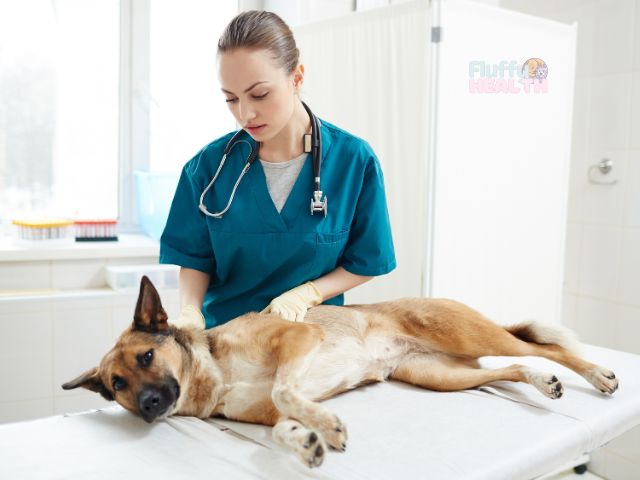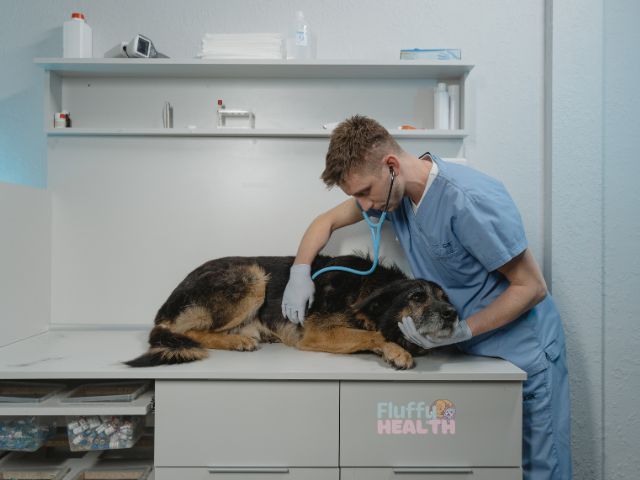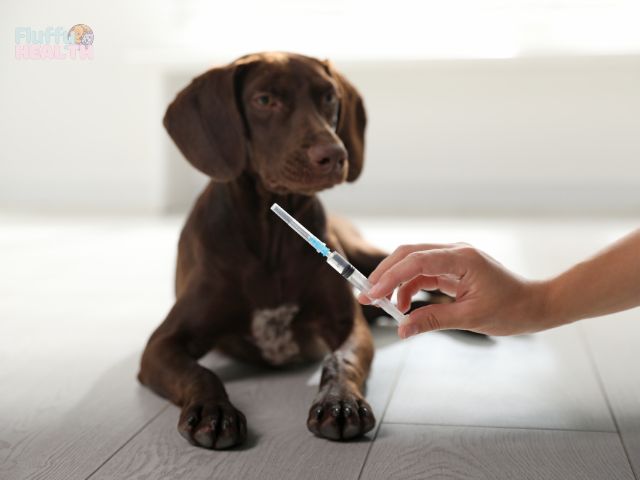What are the common diseases in dogs? One of the first questions that might pop up in your head when your puppy gets sick for the first time! As any dog owner, knowing the health risks your pet may face is important. Over the last few months, I’ve researched myself the most common diseases in dogs, driven by my concern for a friend’s dog who was very sick. This research raised several important questions, such as: “What are the common diseases in dogs?” You need to ask these kinds of questions to prevent such diseases and keep your dog healthy.
In today’s article, we’ll cover the most common diseases that dogs suffer from and their common symptoms. It’s also important not only to safeguard your own dog but also to help protect the wider canine community. Our dogs are not just animals we own; they are beloved members of our families. As I often say, “A True Friend, A Priceless Treasure.”
Nevertheless, understanding how to prevent infectious diseases, for example, is important. These infections can spread in many ways—through the air, by direct contact with contaminated objects like bedding or bowls, or even through insects and other wild animals. Just as with humans, preventing these diseases is key to maintaining the health of your dog and those around them from animals and humans.
Remember that pets often form close bonds with our children. This makes it even more important to take care of their health. By welcoming a dog into your family, you commit to providing them with the love and adequate care needed to keep them happy as a new member of the family.
Given the importance of this topic, I will break it down into several articles which I will write throughout the next weeks. Each one will cover different aspects of canine health, starting with an overview of common diseases. We’ll also discuss vaccinations, including what vaccines are and the differences between core and non-core vaccines, and we’ll review the best times for vaccination.
Without further ado, let’s begin exploring these important health concerns together, providing you with the needed knowledge to keep your dog healthy and happy.
Table of Contents
Protecting Your Dog From Common Diseases & Conditions
It’s amazing how quickly a puppy becomes a member of your family. You might consider your dog a child whom you heartfully want to protect, play with, and feed. The strong bond between your dog and you is not just strong, it’s life-changing.
The most caring and considerate dog owners are those who are proactive about their pets’ health, ensuring quick recovery from diseases and striving to prevent diseases whenever possible. Just like children, dogs require substantial healthcare attention, including regular medication, vaccinations, and plenty of tender loving care.
Now, let’s dive into some of the common infections and diseases that can affect our canine companions:
- Canine Coronavirus: This highly contagious virus primarily affects the upper two-thirds of the small intestines, leading to gastrointestinal distress in dogs.
- Canine Hepatitis: Often mistaken for Canine Distemper, this viral disease can severely affect a dog’s liver and other vital organs.
- Canine Distemper: A severe and highly contagious disease transmitted through the air from one dog to another. There is no known cure for Canine Distemper, which underscores the importance of vaccination.
- Canine Influenza (Dog Flu): This highly contagious viral infection manifests symptoms similar to kennel cough.
- Kennel Cough: Easily transmitted through the air, this condition causes a highly contagious respiratory infection in dogs.
- Canine Parainfluenza: This contagious respiratory virus can spread through direct contact with infected dogs or contaminated items like bowls and bedding.
- ParvoVirus: A life-threatening virus that is highly contagious among dogs, particularly affecting puppies.
- Rabies: A fatal viral disease that dogs can contract from the bite of an infected wild animal or through direct contact with infected saliva on an open wound.
- Leptospirosis: This disease is caused by bacteria in contaminated water sources such as lakes and can lead to severe kidney and liver damage.
In addition to these infections, several medical conditions are also significant:
- Eye Problems in Dogs: Eye issues are common in many breeds, from infections to cataracts.
- Ear Problems in Dogs: Including infections and mites, which can cause discomfort and hearing issues.
- Dental and Mouth Problems: Periodontal disease is prevalent and can lead to serious health issues if untreated.
- Nasal Disorders: These can affect a dog’s sense of smell and ability to breathe correctly.
- Parasites, Fleas, and Ticks: External parasites can cause severe skin problems and other health complications.
- Skin Conditions: Such as allergies and eczema are frequent concerns for many dog owners.
- Hereditary Defects and Conditions: Certain breeds are prone to specific genetic disorders that prospective owners should be aware of.
- Detailed Discussion on Dog Vaccinations: Understanding the importance of vaccines in preventing many of the diseases mentioned above.
As we continue this series of articles, we will explore each of these topics in broader detail, giving you the knowledge to better care for your beloved dog.

The Importance Of Dog Vaccinations For Preventing Diseases
Understanding the common diseases in dogs highlights the importance of vaccinations. Much like children, who require consistent healthcare and attention, our pets also need timely vaccinations to ensure they remain healthy. Vaccinating your dog is one of the most wise steps you can take to maintain their health and prevent the onset of serious infections and diseases.
Effectiveness of Vaccinations
Many studies have shown that vaccinations significantly reduce the incidence of diseases such as distemper and parvovirus, which have historically been major causes of death in dogs. For instance, the widespread use of the parvovirus vaccine has led to a dramatic decrease in cases since its introduction in the late 1970s. The American Veterinary Medical Association (AVMA) supports the idea that comprehensive vaccination programs are responsible for controlling the status of many infectious diseases in dogs.
Early Life Vaccinations
Vaccinations are important early in a dog’s life to protect against several harmful diseases, such as distemper, hepatitis, parvovirus, leptospirosis, and kennel cough—some of which can be fatal. Puppies receive antibodies from their mothers that begin to diminish around six to eight weeks of age, which is when the first vaccinations should be administered.
Booster Shots
As your puppy grows, it will require booster shots to maintain its immunity against these dangerous conditions. Continuing immunity depends on these follow-up vaccines tailored to the dog’s age and the vaccine type.
Proven Protection
Vaccines are the only proven method to protect not only pets but also humans from various diseases. For example, the rabies vaccine, required by law in many places, not only protects dogs but also prevents the potential transmission of the virus to humans. According to the Centers for Disease Control and Prevention (CDC), controlling rabies in dogs is one of the most effective ways to prevent rabies in humans. Therefore, ensuring that your dog receives vaccinations at the appropriate times is critical for their long-term health.
Curious about the specifics of each vaccine and when to administer them? Read more in our detailed guide on dog vaccinations here. Learn more about vaccination and keep your pet healthy and happy throughout their life.
Keeping Your Dog Safe from Parasites
As a dog owner, you know how important it is to keep your dog happy and healthy. One big part of that is protecting it from parasites like fleas, ticks, and worms. These tiny bugs can make your dog and you sick and uncomfortable, so it’s important to stop them before they can harm you.
Fleas and Ticks
These little bugs are not just annoying; they can make your dog really itchy and even spread diseases. Fleas can cause your dog to scratch a lot, and ticks can carry serious illnesses like Lyme disease. They can also spread to infect other pets you might have at home or in the neighborhood. So, to keep these pests away, your vet can recommend medicines like special collars, skin creams, or chewable tablets that your dog can eat.
This is a scary kind of worm because it lives in the heart and lungs of dogs and is spread by mosquitoes. It can make dogs really sick and can even be deadly if not treated quickly. The good news is that you can give your dog medicine every month to protect them from heartworms.
Worms in the Gut
Your dog can also get worms in its tummy, such as roundworms, hookworms, and others. These worms take nutrients from your dog’s food (basically stealing your dog’s nutrition), which can make your dog weak and sick. Giving your dog worm medicine, which your vet will help you pick, can keep these worms away.
How to Keep Your Dog Free from Parasites
- Always give your dog the flea, tick, and worm medicines on time, just like your vet tells you.
- Keep your dog’s sleeping area clean by washing their bedding often.
- Check your dog for any signs of bugs like extra scratching or little worms in their poop.
- Talk to your vet about the best way to keep bugs away from your dog, especially if it spends a lot of time outside or with other animals like wild animals.
Taking these steps can help prevent parasites from bothering your dog. Your dog will be happier, healthier, and ready to play without any itchy distractions!

Dental Health: Keeping Your Dog’s Smile Bright
Just like you brush your teeth every day, your dogs need clean teeth, too! Keeping your dog’s teeth clean helps prevent bad breath and keeps their gums healthy. Poor dental health in dogs can lead to serious problems, like infections that can spread to other parts of their body.
Why Dental Care is Important:
- Prevents Tooth Decay: Regular brushing helps prevent plaque and tartar build-up, which can lead to painful tooth decay.
- Avoids Gum Disease: Just like in humans, gum disease can make eating painful and lead to more serious health issues in dogs.
- Keeps Overall Health in Check: Believe it or not, good dental care can actually help your dog live a longer, healthier life.
Tips for Dental Care:
- Brush your dog’s teeth regularly with a toothbrush and toothpaste made just for dogs.
- Give them dental chews that help clean their teeth while they have fun chewing.
- Make sure to visit the vet for a dental check-up at least once a year.
Taking good care of your dog’s teeth is very important. Brushing your dog’s teeth can prevent any unwanted problems that might occur from being lazy, and on the positive side, it can improve your dog’s breath smell.
Grooming: More Than Just Good Looks
Grooming regularly isn’t just about making your dog look cute—it’s about keeping it healthy, too! Grooming pets such as dogs and cats can help prevent skin diseases and help you spot any unusual signs early, like bumps, wounds, or unwanted bugs.
Benefits Of Regular Grooming:
- Prevents Skin Problems: Brushing your dog helps remove dead hair and skin and spreads its natural oils, keeping its coat shiny and healthy.
- Prevents Unwanted Bugs: Grooming is one way to spot bugs such as ticks and fleas early, treat them fast, and prevent any further complications from spreading.
- Reduces Allergies: Clean dogs bring fewer allergens into your home, which is good for everyone, especially if someone or your kids have allergies.
- Strengthens Bonds: Spending time grooming your dog is a great way to strengthen your bond with them; they will love you more.
Grooming Tips:
- Brush your dog’s fur regularly to prevent skin and other problems from occurring.
- Bathe them only as often as needed, using a dog-specific shampoo.
- Check their ears, eyes, and teeth during grooming sessions for any signs of problems.
Stress & Health: Keeping Your Dog Happy
Did you know that your dog can feel stressed just like you do? And just like any human, too much stress can make dogs sick. Keeping your dog happy and stress-free is really important for their overall health.
How Stress Affects Dogs:
- Can Cause Digestive Problems: Just like in humans, stress can upset a dog’s stomach and lead to digestive issues.
- Leads to Behavioral Changes: A stressed dog might chew on things, bark a lot, or have accidents in the house.
- Affects Overall Health: Long-term stress can weaken a dog’s immune system, making them more likely to get sick.
Ways to Reduce Stress:
- Keep a regular routine so your dog knows what to expect each day, such as feeding it at specific times and taking it for a walk.
- Provide plenty of exercise and playtime.
- Offer quiet spaces at home where your dog can relax and feel safe.
Keeping an eye on your dog’s stress levels, behaviors, and overall health is the best way to protect it from conditions that can affect its life.
Common Environmental Hazards for Dogs
Sometimes, the everyday things around us can be dangerous to our pets without us even realizing it. Knowing about these hazards can help you keep your dog safe from harm.
Typical Hazards Include:
- Toxic Plants: Many common household and garden plants, like lilies and sago palms, are poisonous to dogs.
- Human Foods: Foods like chocolate, grapes, and onions are toxic to dogs and should be kept out of their reach.
- Household Chemicals: Cleaners, antifreeze, and insecticides can be deadly if ingested by your dog.
How to Protect Your Dog:
- Keep hazardous substances locked up and out of your dog’s reach.
- Teach your dog important commands like “leave it” to prevent them from picking up or chewing dangerous items.
- Be aware of what’s in your environment when walking your dog, especially in unfamiliar areas.
Educating yourself about these hazards can help create a safer space for your dog at home and outdoors.
Seasonal Health Concerns for Dogs
Each season brings different health concerns to humans and the same for our pets. Being aware of these problems can help you keep your dog healthy all year round.
Seasonal Issues to Watch For:
- Summer: Heatstroke, dehydration, and paw burns from hot asphalted paths are common in the summer.
- Winter: Hypothermia (the condition where a dog’s body temperature is significantly lower than normal) and frostbite can occur in cold weather, and antifreeze poisoning is a risk due to its sweet taste.
- Spring/Fall: Pollen can trigger allergies, and wet seasons can increase the risk of infections like leptospirosis.
Seasonal Care Tips:
- Provide plenty of fresh water and shade during hot weather, and never leave your dog in a closed car.
- Consider dog-safe coats and booties to protect against the cold and salt on roads in cold weather.
- Keep your home allergen-free by regular cleaning and possibly using air purifiers during high pollen seasons.
Adjusting your care routine to the season can help your dog stay comfortable and healthy year-round.
Regular Veterinary Check-ups
Just like humans, dogs benefit greatly from regular health check-ups. These visits can detect problems before they become serious, guaranteeing your dog stays healthy all the time.
Importance of Vet Visits:
- Early Disease Detection: Regular check-ups can catch diseases like cancer or diabetes early when more treatable.
- Vaccination Updates: Your vet will keep your dog’s vaccinations current, which is crucial for preventing disease.
- Dental Health Checks: Vets often check your dog’s teeth and gums to prevent dental problems, which can lead to other health issues.
How Often Should You Visit the Vet:
- Puppies and older dogs should visit the vet more frequently, typically every 6 months.
- Adult dogs should have a check-up at least once a year.
Making regular vet visits a part of your dog care routine can keep your dog healthy and give you peace of mind knowing your dog is healthy.

Conclusion
After talking generally about the most common diseases in dogs, it’s clear now that being a proactive and informed dog owner is essential to ensuring your dog’s health and happiness.
From understanding and preventing parasites to recognizing the dangers of common environmental hazards, each step you take contributes to a safer, healthier life for your dog. Remember, regular vet check-ups and staying vigilant about seasonal health concerns are essential practices that help catch and prevent issues before they become serious.
With all of this information, you can enjoy the wonderful journey with your dog, knowing you provide the best care for your loyal companion.


Your article was very informative, I have 2 big dogs and we have gotten them their vaccinations on time, but I never knew that all those diseases even exist. Now your article have made me more aware of what I need to look at for . Like you said the dog becomes part of the family and I want my dog to be healthy. thank you. I will keep my eye out for new articles.
This is the key to protect our pets, to have enough information about everything which is good to keep our pets and even ourselves healthy and happy.
I am glad that you found this article helpful.
Thank you for such a thorough article. We just recently took in a stray puppy, so I am online trying to figure this all out. Vaccinations are extremely important in my opinion and I want my new puppy to be strong and healthy. Being a stray, I don’t have any history on the pup, how do I know what vaccines he will need? I really don’t even know how old he is either, is this something a veterinarian will be able to help me with?
I am glad that you find this article helpful for you, regarding your question I suggest you read this post about vaccinations, if you have further questions after reading it I will be happy answering them.
https://fluffyhealth.com/what-is-dog-vaccinations-what-is-in-dog-vaccinations-is-it-important/
Wow, it’s almost overwhelming seeing all the diseases that can be a threat to our pets lives. But I’m glad you shared this list, because it’s better to be prepared than to be caught off guard.
I’m going to bookmark this article for future reference. I want to be able to check your information again when I need it. Thanks for making this check list.
Yes, it is surprising to see all these diseases lurking around us and our pets and it is always the best to be prepared for such things.
I am glad to see that you found it helpful and informative.
This has got to be one of the most in depth articles on canine wellness that I have read. A lot of the diseases listed above, I would have no idea even existed. All around this article has made more aware of all the potential illnesses our dogs can contract.
Well done, another great article Dr. Alkhawaldeh
I am happy that you found this article useful and informative for you.
Thank you very much and I hope you enjoy more posts.
I wish I’d known more about taking care of my pets on a more professional and thorough basis because I’m pretty sure all of my pets would have lived much longer and happier lives.
I think it’s great that you’re educating people on how to take care of their pets and I think you’ll be an amazing role model, especially for younger kids that just got their first pooch and aren’t sure where to start.
Thank you very much, I am glad that you liked my article. I will for sure keep the hard work and hope to see you around soon.